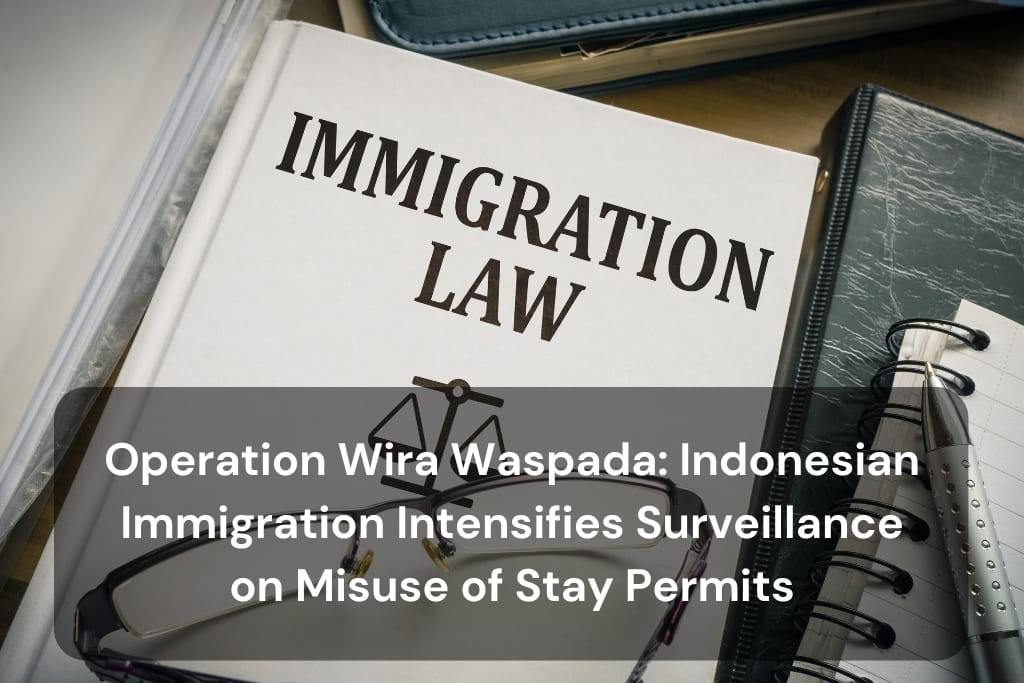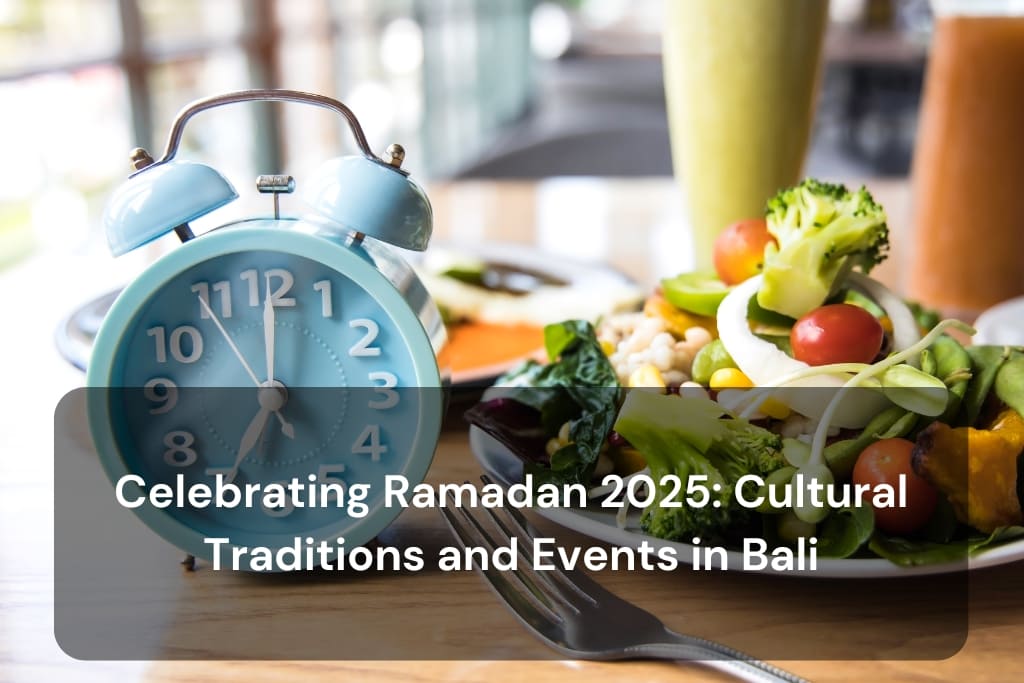Operation Wira Waspada: Indonesian Immigration Intensifies Surveillance on Misuse of Stay Permits

In a significant move to strengthen immigration enforcement, the Directorate General of Immigration in Indonesia has launched Operation Wira Waspada, a comprehensive initiative aimed at combating the misuse of stay permits by foreign nationals (FNs) in key sectors such as tourism and mining. This operation, conducted in regions with high foreign activity like Bali and North Maluku, marks a new era in immigration vigilance, ensuring that all foreign visitors adhere to the country’s regulations. This article delves into the details of Operation Wira Waspada, its objectives, and the impact it has on maintaining order and compliance with immigration laws in Indonesia. 1. Background and Objectives of Operation Wira Waspada Operation Wira Waspada is part of a broader strategy by the Indonesian Immigration Department to enhance enforcement and compliance with immigration laws. The operation’s name, derived from Sanskrit, reflects the spirit of vigilance and bravery in safeguarding national interests. By focusing on sectors where foreign nationals are most active, such as tourism and mining, the operation aims to prevent illegal activities and ensure that all foreign visitors contribute positively to the economy. The primary objectives include: 2. Implementation of Operation Wira Waspada Operation Wira Waspada involves a multi-agency approach, with the Immigration Department working closely with other stakeholders such as the police and the Investment Coordinating Board (BKPM). The operation is conducted in phases, with the first phase taking place from January 14 to 17, 2025, and the second phase from February 17 to 21, 2025. In Bali, the operation focuses on areas with high concentrations of foreign nationals, such as tourist hotspots and business districts. Teams conduct on-site inspections to verify the status of foreign nationals and their compliance with visa conditions. This includes checking for overstaying, unauthorized work, and misuse of stay permits. During the operation, significant findings have been reported: These actions demonstrate the seriousness with which Indonesian authorities are addressing visa misuse and ensuring that foreign nationals comply with local regulations. 3. Impact of Wira Waspada In Bali, Operation Wira Waspada has significant implications for the tourism sector, which is a major economic driver for the island. By enforcing strict immigration controls, the operation helps maintain the integrity of Bali’s tourism industry, ensuring that foreign visitors respect local laws and contribute positively to the economy. In North Maluku, the focus on the mining sector aims to prevent unauthorized foreign labor and ensure compliance with employment laws. This not only protects local workers but also safeguards the environment by preventing illegal mining activities. Operation Wira Waspada sets a precedent for future immigration enforcement in Indonesia. The operation’s success in identifying and addressing visa misuse will likely lead to more stringent regulations and increased surveillance across the country. For foreign nationals planning to visit or work in Indonesia, this operation serves as a reminder of the importance of complying with immigration laws. It also underscores the need for potential investors and workers to understand the specific requirements and restrictions associated with different types of visas. Conclusion Operation Wira Waspada marks a significant step forward in Indonesia’s efforts to strengthen immigration enforcement and prevent the misuse of stay permits. By targeting high-risk sectors and regions, the operation ensures that foreign nationals contribute positively to the economy while respecting local laws. As Indonesia continues to grow economically, maintaining a robust immigration system is crucial for protecting national interests and fostering a stable business environment. With Operation Wira Waspada, Indonesia sends a clear message that it will not tolerate visa abuse, reinforcing its commitment to legal compliance and national security.
Celebrating Ramadan 2025: Cultural Traditions and Events in Bali

Bali, known for its vibrant cultural landscape and predominantly Hindu population, also hosts a significant Muslim community that observes the holy month of Ramadan with unique traditions and events. Despite being a minority, Muslims in Bali have maintained their cultural practices while embracing the island’s diverse religious harmony. This article explores the fascinating Ramadan traditions in Bali, highlighting how the island celebrates this sacred period with a blend of local and Islamic customs. 1. Understanding Ramadan in Bali Ramadan, the ninth month of the Islamic calendar, is a time of fasting, reflection, and community bonding for Muslims worldwide. In Bali, where Muslims are a minority, Ramadan is observed with respect and tolerance from the broader community. The fasting period typically begins before sunrise and ends at sunset, with Muslims gathering for sahur (pre-dawn meal) and iftar (evening meal) to break their fast. For Ramadan 2025, which falls from February 28 to March 30, Muslims in Bali will follow the fasting schedule closely, with imsak (the cut-off time before fasting begins) at approximately 04:30 and maghrib (evening prayer and breaking of the fast) at around 18:01. 2. Unique Ramadan Traditions in Bali Bali’s Muslim community has developed distinct traditions that reflect the island’s cultural richness and religious tolerance: Megibung: A Shared Meal Tradition One of the most notable traditions is Megibung, a communal meal practice that dates back to the 17th century. Originating from the Karangasem Kingdom, Megibung involves sharing food from a large communal dish, fostering a sense of community and togetherness among Muslims during Ramadan. This tradition is particularly observed in areas like Kampung Islam Kepaon, Denpasar, where residents gather to break their fast together after maghrib prayers. Ngabuburit: Passing Time Before Iftar Ngabuburit wis a popular activity among Muslims in Indonesia, including Bali, where they spend time before breaking their fast by engaging in various activities such as reading the Quran, attending religious lectures, or participating in community events. In areas like Kampung Jawa and Kampung Bugis, Muslims often gather in mosques or community centers for these activities. Masjids as Community Hubs Mosques in Bali become vibrant centers of activity during Ramadan, hosting tarawih prayers, Quran recitation sessions, and other community events. Masjid Nurul Huda in Gelgel Village and Masjid Agung Palapa in Dreamland are notable examples where Muslims gather for spiritual activities and social bonding. 3. Ramadan Events and Promotions in Bali Bali’s top resorts and restaurants offer special Ramadan promotions, making the island an attractive destination for those celebrating the holy month: 4. Eid al-Fitr Celebrations in Bali Following the month of Ramadan, Muslims celebrate Eid al-Fitr, known locally as Lebaran, which marks the end of fasting. This festive period, typically observed from March 30 to April 8, 2025, is a time for family reunions, feasting, and exchanging gifts. In Bali, Eid al-Fitr is celebrated with traditional dishes like ketupat and beef rendang, and it’s common for Muslim families to share these delicacies with their neighbors. 5. Respecting Ramadan in Bali While Bali’s predominantly Hindu population means that daily life continues relatively unchanged during Ramadan, visitors can show respect by being mindful of fasting times and cultural practices: Conclusion Ramadan in Bali is a unique blend of Islamic traditions and Balinese cultural harmony. The island’s Muslim community celebrates this sacred month with distinct practices like Megibung and Ngabuburit, while top resorts offer special Ramadan events and promotions. Whether you’re a Muslim observing the fast or a visitor interested in cultural experiences, Bali provides a welcoming environment to explore and appreciate the richness of Ramadan traditions.

